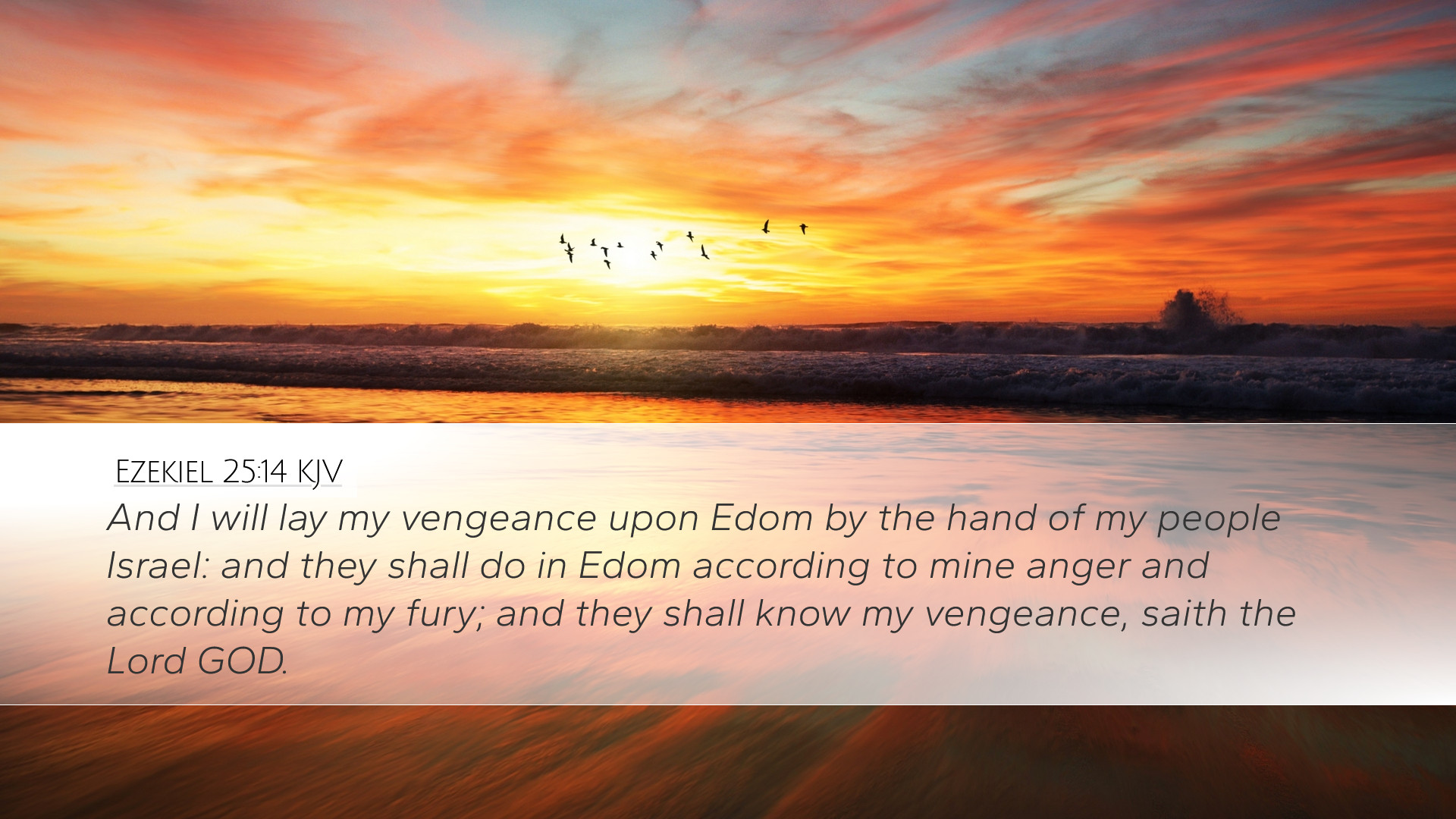Ezekiel 25:14 Commentary
Ezekiel 25:14 states: “I will lay my vengeance upon Edom by the hand of my people Israel: and they shall do in Edom according to my anger and according to my fury; and they shall know my vengeance, saith the Lord God.” This verse is part of a larger prophetic message where God declares judgment against several nations, particularly focusing on Edom. The following commentary synthesizes insights from public domain sources to provide a comprehensive understanding of this scripture.
Context and Background
The prophecy contained in Ezekiel 25 is positioned in a period when Israel is dealing with the aftermath of its own sin and the consequent judgment from God. Edom, historically, is seen as the brother of Israel, descending from Esau, while Israel descends from Jacob. Their relationship has been marred by animosity, which ultimately leads to divine judgment.
This chapter serves as a divine pronouncement against various nations that have taken pleasure in Israel's downfall. Edom's specific role stands out because they not only rejoiced in Israel's calamities but actively participated in them. The broader narrative of Ezekiel discusses God's sovereignty and judgment as a theme crucial for understanding this divine rebuke.
The Nature of God’s Vengeance
In this verse, God declares that His vengeance will be executed through Israel, which emphasizes His sovereignty and the means by which He administers justice. Matthew Henry notes that this divine vengeance is not capricious but rather a direct response to Edom's hostility towards Israel. Edom's actions against Israel are similar to those of other nations, aligning them with God’s enemies.
Furthermore, Albert Barnes points out that God's justice is clear in its execution; He utilizes Israel as an instrument of His judgment. This reflects God's desire for His people not only to receive mercy but also to act as agents of His will. The penalty meted out to Edom serves as an indicator of God's righteousness.
Israel as God's Instrument
The fact that Israel is chosen as the instrument of God's vengeance is significant. Adam Clarke elaborates on Israel being “the rod of God’s anger.” This can be interpreted in a dual manner: as a means of executing judgment and as a process for Israel to regain its standing before God. The text implies that through their actions, Israel will recognize the depth of God’s anger and fury toward sin.
This duality serves as a critical reminder for the modern believer that God chooses to work through His people—a theme echoed in the New Testament, where believers are called to represent Christ and His message of righteousness in a world often contrary to Him.
Theological Implications of Vengeance
The implications of God’s vengeance manifest in several ways. Firstly, it marks the seriousness with which God regards wrongdoing. As Henry remarks, God's vengeance is not to be taken lightly or viewed as mere retribution; it is part of His holy character. It also emphasizes God’s role as judge over the nations, revealing a God who is intimately involved with the affairs of humanity.
Additionally, Barnes posits that Edom’s punishment is a demonstration of God's justice—a sentiment that resonates in New Testament teachings on divine recompense for sin and rebellion against God. This judgment serves as a cautionary tale for nations and individuals alike about the consequences of enmity towards God’s people.
Application for Believers
For contemporary believers, Ezekiel 25:14 emerges as a striking reminder of the complexities of God’s justice and mercy. Adam Clarke suggests that the church, as the New Testament version of God’s chosen people, must be vigilant against harboring bitterness or hostility towards others, even those who oppose them.
Moreover, this scripture encourages an understanding of God's nature as one that is responsive to injustice. Believers are reminded to align their lives with God's justice, seeking to advance His kingdom while simultaneously reflecting His love and grace.
Conclusion
Ezekiel 25:14 offers profound insights into the nature of God’s judgment and His use of Israel as an instrument to execute His will. The intricate historical context combined with theological applications challenges believers today to understand their role within God's sovereign plan. As they consider the implications of divine vengeance and mercy, they are called to reflect on their relationship with God and their responsibilities to one another, always aspiring toward justice, love, and reconciliation in a world that often mirrors the enmity displayed by Edom.


